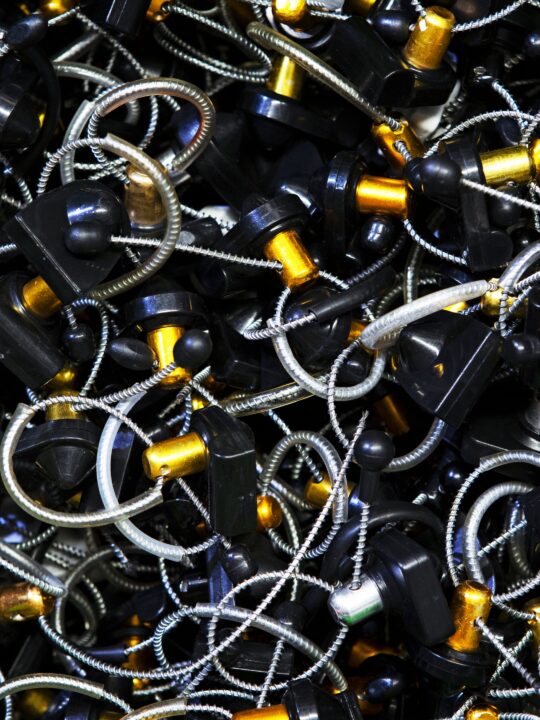Sure, protect your spirit aisle from shoplifters. Just don’t alienate honest shoppers.

For as long as there have been shoppers, there have been shops. And for as long as there have been shops, there have been shoplifters.
Shoplifting is not a new phenomenon. In small doses, it can be more of an occasional inconvenience rather than something for shop owners to lose sleep over. But, at its worst, shoplifting can eat into a business’ profits, intimidate shoppers and make staff feel unsafe.
And now it’s on the rise.
According to Statista, approximately 342,343 shoplifting offences were recorded in the 2022/2023 reporting year. That’s compared with 275,076 offences in the previous year (an increase of 24%). To make matters worse, it looks like these figures will continue to grow next year too.
Medicines and baby formula are two of the most common items stolen from UK supermarkets, but the BWS (beer, wine and spirits) category is high up the list too. As a result, different retailers are trialling different anti-theft measures to prevent shoplifters from targeting their alcohol aisle with a five-fingered discount.
The question is… which measures are most effective, and what impact are they having on honest shoppers?
A common crime
Last week, I was in a supermarket conducting some eye-tracking research. While looking up and down the aisles, I overheard the following conversation between one of the supermarket’s employees and a couple of police officers who’d just entered the store…
Employee: “They were in again, the same lot as last week.”
Police: “When was this? Which way did they go?”
Employee: “They left a while ago.”
What struck me wasn’t the fact that this conversation felt like a regular occurrence. Nor was it the idea that store workers across the UK are feeling powerless to stop shoplifters.
What struck me was this: while shoplifting is on the rise, there was one section in this particular shop where it was undoubtedly down.
The spirit aisle.
Spirits buck the trend
With their relatively high value and compact shape and size, spirits are usually an easy target for shoplifters. But in this store, they weren’t, because they were locked behind a clear glass door — and only employees had the key.
If you’re reading this in the US, then such an image might be a familiar one. Walk into your average chemist across the pond and everything from shower gel to makeup will be under lock and key. But for those of us in the UK, having to stop and ask a shop assistant to retrieve a can of Lynx Africa is very much an alien concept.
And, as any researcher knows, new experiences mean unexpected outcomes.
Solving one problem but causing another?
Shoplifters aren’t the only interested party who will be affected by locking spirits behind glass doors. Yes, those spirits will be harder to steal, but they’ll also be more difficult for honest customers to purchase too.
Picture the scene. You’re late for a friend’s wine and cheese night, so you go to your local corner shop to grab a bottle of half-decent chianti. Inside, you find that the wine section is locked behind a glass door, so you press a button and wait for an employee to unlock it for you. You wait, and wait, but the shop assistant is busy sorting out a parcel at the till. The seconds tick by, and you’re getting later and later. Are you going to wait much longer, or are you going to take your business elsewhere?
While 99.9% of shoppers might agree with the sentiment of reducing shoplifting, far less will be thrilled with the practical implications. The lesson is simple: for any anti-theft measures a shop chooses, they will need to consider all the potential consequences — and not just the obvious positives.
Let’s look at locked glass doors as an example…
Locked glass doors: the pros
Reduces chance of theft and keeps stock safe
Protects staff and lets them focus on providing great customer service, rather than keeping an eye on everyone who wanders into the alcohol section
Looks tidy and makes managing stock levels (plus reordering) easier
Reduces revenue loss from theft
Locked glass doors: the cons
Means customers can’t browse through the products, or look at a wine label and pretend like they know what they’re doing
Takes control away from the customer and prevents them from shopping at their own speed
Forces customers to loiter in the alcohol section, which can be an uncomfortable experience for some (e.g. those working in education who might not want pupils to see them “hanging around the booze”)
The solution?
In a perfect world, we could simply trust people not to shoplift. But our world is far from perfect, which means we need a solution.
The difficulty is that there isn’t a universal answer. The effectiveness of any tactic will vary depending on location, store layout, and a whole host of other factors. Nevertheless, it’s absolutely essential that shop owners identify a solution which protects revenues without diminishing the overall customer experience.
At Trinity McQueen, it’s our job to help shops find that balance by sticking up for their customers. We look beyond what they say to understand what their true behaviours will be, so that you can predict the full impact of anti-theft measures more accurately.
So, if you’d like to know what honest shoppers are really thinking, then please get in touch.

 Back to articles
Back to articles

